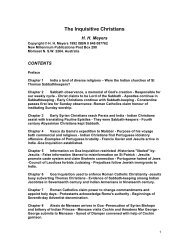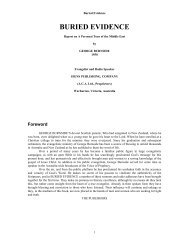Battle of the Bibles - Present Truth
Battle of the Bibles - Present Truth
Battle of the Bibles - Present Truth
Create successful ePaper yourself
Turn your PDF publications into a flip-book with our unique Google optimized e-Paper software.
JB "Christ, our, passover, has been sacrificed".<br />
NIV "For Christ, our Passover lamb, has been sacrificed".<br />
For those who are inclined to minimise <strong>the</strong> importance <strong>of</strong> <strong>the</strong> two missing words:<br />
'for us", it is here pertinent to quote B.G. Wilkinson: "That Christ was sacrificed is an<br />
historical fact; that He was sacrificed 'for us" is a doctrine and <strong>the</strong> very basis <strong>of</strong> which <strong>the</strong><br />
Gospel rests. Take away <strong>the</strong> fact that he died for us, as <strong>the</strong> Revisers did in this text, and<br />
<strong>the</strong>re is no Gospel left. The leading Revisers, in particular, Westcott and Hort, rejected<br />
<strong>the</strong> idea that Christ was our substitute and sacrifice" ("Our Authorised Bible Vindicated",<br />
p 193).<br />
Group 6. Against Christ's Resurrection and Ascension, and Second<br />
Advent<br />
If <strong>the</strong>re is one thing <strong>the</strong> Gnostics and Rationalists cannot stomach, it is <strong>the</strong> fact <strong>of</strong><br />
Christ's resurrection and ascension. It follows <strong>the</strong>n that <strong>the</strong> doctrine <strong>of</strong> His second<br />
advent must be a nonsense to such unbelievers.<br />
Mat<strong>the</strong>w 24:3<br />
"Tell us, when shall <strong>the</strong>se things be? and what shall be <strong>the</strong> sign <strong>of</strong> thy coming<br />
and <strong>of</strong> <strong>the</strong> end <strong>of</strong> <strong>the</strong> world?"<br />
Douay "And what shall be <strong>the</strong> sign <strong>of</strong> They coming and <strong>of</strong> <strong>the</strong> consummation <strong>of</strong><br />
<strong>the</strong> world?'<br />
RV Note "And what shall be <strong>the</strong> sign <strong>of</strong> Thy presence and <strong>of</strong> <strong>the</strong> consummation<br />
<strong>of</strong> <strong>the</strong> age?'<br />
RSV "and what will be <strong>the</strong> sign <strong>of</strong> your coming and <strong>of</strong> <strong>the</strong> close <strong>of</strong> <strong>the</strong> age?"<br />
NIV "and what will be <strong>the</strong> sign <strong>of</strong> your coming and <strong>of</strong> <strong>the</strong> end <strong>of</strong> <strong>the</strong> age?'<br />
Not that all <strong>the</strong> above (except <strong>the</strong> Revised Version which relies on a note to inject<br />
uncertainty) are indefinite as to <strong>the</strong> precise nature <strong>of</strong> <strong>the</strong> event. "The end <strong>of</strong> <strong>the</strong> age"<br />
could refer to any <strong>of</strong> earth's historical periods, such as <strong>the</strong> age <strong>of</strong> Roman rule, <strong>the</strong><br />
supremacy <strong>of</strong> an empire, or a social era.<br />
Mark 16:9-20<br />
"Now, when Jesus was risen early <strong>the</strong> first day <strong>of</strong> <strong>the</strong> week, he appeared first to<br />
Mary Magdalene ...After that he appeared in ano<strong>the</strong>r form unto two <strong>of</strong> <strong>the</strong>m ... Afterward<br />
he appeared unto <strong>the</strong> eleven as <strong>the</strong>y sat at meat ... So <strong>the</strong>n after <strong>the</strong> Lord had spoken<br />
unto <strong>the</strong>m he was received up into heaven, and sat at <strong>the</strong> right hand <strong>of</strong> God".<br />
RV Note "The two oldest Greek manuscripts and some o<strong>the</strong>r authorities omit<br />
from verse nine to <strong>the</strong> end".<br />
RSV Note The chapter ends with verse eight and verses nine to twenty are<br />
recorded in note .<br />
NIV "The translators preface verses nine to twenty with <strong>the</strong> observation,: "The<br />
most reliable early manuscripts do not have Mark 16:9-20-.<br />
If "<strong>the</strong> most reliable manuscripts" do not include <strong>the</strong>se verses, <strong>the</strong>n why include<br />
<strong>the</strong>m in a note? The manuscripts which <strong>the</strong> revisers incorrectly describe are <strong>the</strong><br />
Vaticanus and Sinaiticus which, as we have seen, have at times been rejected by Rome<br />
as inferior to <strong>the</strong> Itala; hence it is fairly predictable that both <strong>the</strong> Douay and <strong>the</strong><br />
Jerusalem <strong>Bibles</strong> should include <strong>the</strong>se verses.<br />
11





